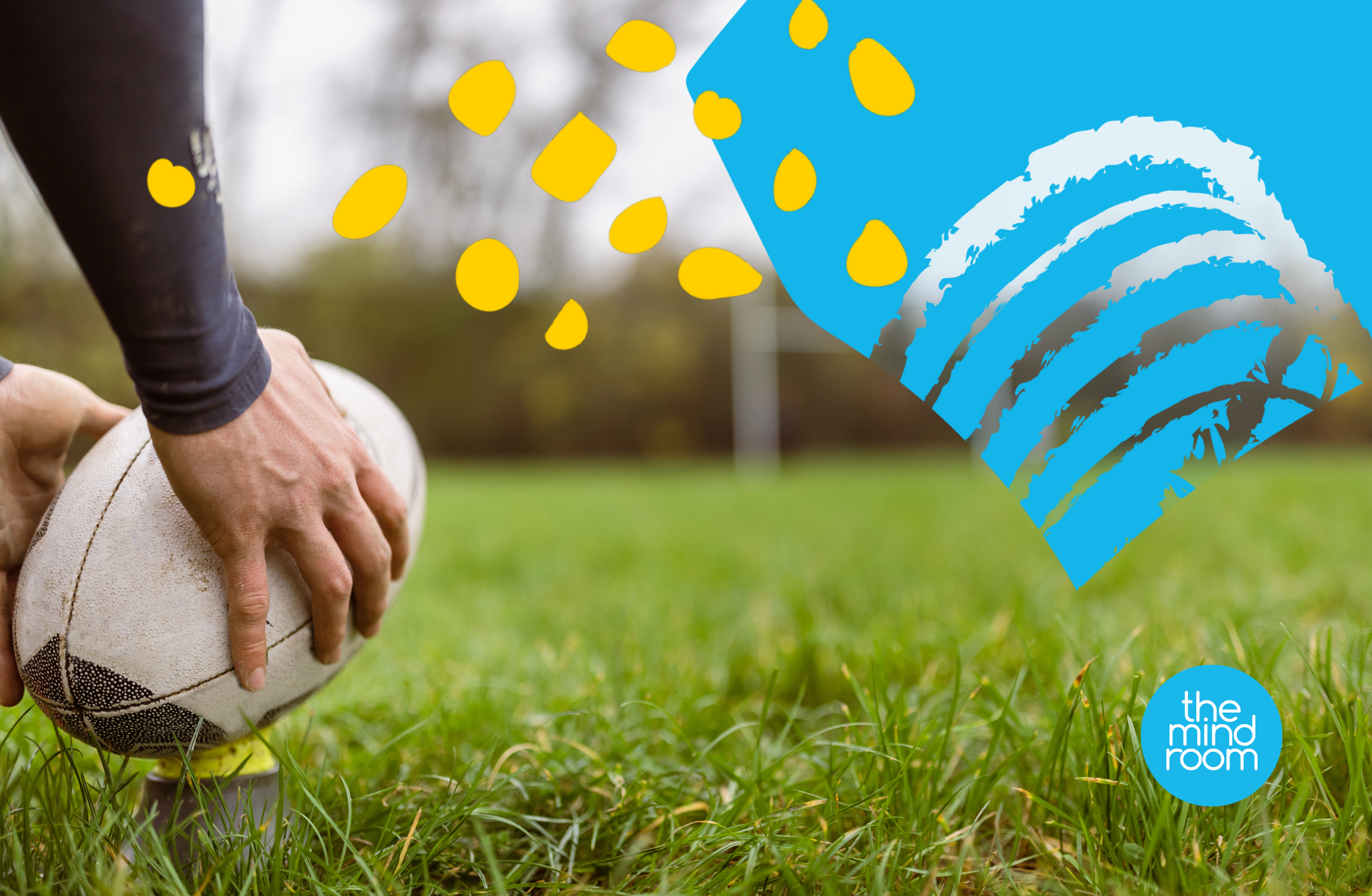Why Self-Criticism Might Be Hurting Your Game

Professor Kristen NeffUnlike self-criticism which asks if you're good enough, self-compassion asks what's good for you?
Hafsa finds herself in a position she had prepared for but not yet experienced in her rugby playing career. With a minute left on the clock, her team is tied, and all eyes are on her as she prepares for a penalty kick.
The pressure is palpable, and the familiar critical voice in her head starts up “you better not screw this up”. Usually, this leads to a rapid and relentless spiral of negative thoughts. However, something surprising happens: instead of getting caught up in the criticism, she feels a surprising sense of calm focus.
Hafsa recalls the voice of her coach from a similar moment in training, saying to her —“What if you responded to your fears with kindness, not criticism?” It’s a question that lingers, reframing the moment as an opportunity to be present, stay focused and trust herself to take the game winning kick.
Whether you’re an elite athlete chasing glory or a surgeon striving for precision, the expectation and pressure to deliver results can create a fertile ground for self-criticism and anxiety. In high-performance fields like sports and medicine, where the stakes are high and the fear of failure looms large, the ability to extend kindness to oneself can be transformative.
This article explores the science and practice of self-compassion, revealing how it can empower people to navigate the pressures of performance and face their fears with resilience and grace.
Understanding Self-Compassion
Self-compassion, as defined by psychologist Kristin Neff, involves treating oneself with kindness during times of difficulty. It encompasses three core elements: mindfulness, common humanity and kindness.
Mindfulness is the capacity to notice our own experience, including uncomfortable thoughts, feelings and behaviours. Common humanity reminds us that everyone struggles, that suffering is part of the shared human condition. Kindness, particularly to self, is the final ingredient.
Before we explore the benefits of self-compassion, it’s helpful to understand self-critical thinking—a common pitfall in high-pressure situations.
Why Self-Critical Thinking?
Self-critical thinking appears to have a significant neurological basis, engaging specific brain regions associated with how we perceive ourselves and manage our emotions. The key brain regions, include the medial prefrontal cortex (mPFC) and the anterior cingulate cortex (ACC), both of which are implicated in self-referential thinking and emotional regulation.
In evolutionary terms, self-critical thinking is believed to enhance social survival and cohesion by promoting alignment with group norms, thus increasing acceptance. It fosters learning and adaptation, allowing individuals to improve behaviours in response to challenges.
Critical reflection also serves as a motivation for self-improvement, driving individuals to strive for higher standards. Self-criticism can aid in error detection and problem-solving, helping individuals recognize mistakes and enhance performance, ultimately benefiting both personal development and group dynamics.
While self-critical thinking can serve some motivational and adaptive functions, its overuse has potential downsides—such as increased anxiety and depression, decreased motivation, impaired self-esteem, reduced resilience, and negative impacts on relationships—which underscore the importance of balancing self-criticism with self-compassion. This balance can foster a healthier mindset that promotes well-being and performance.
Interestingly, the interplay of self-criticism and self-compassion is not a straightforward dichotomy. A study by Neff and Vonk suggests that those who engage in self-critical thinking may be mindfully attuned to their feelings of inadequacy and suffering. This heightened awareness can lead to a greater appreciation for the common humanity aspect of self-compassion. Recognizing that struggles and imperfections are universal experiences can then open the door to encourage self-critical individuals to choose to extend greater kindness to themselves.
This counterintuitive relationship highlights how awareness of our shortcomings can lead to a more profound understanding of the human experience—if we allow it.
The Science of Self-Compassion
What is it about self-compassion that makes it such a powerful antidote to the pressures faced by athletes and medical professionals alike?
Research supports the idea that self-compassion can enhance resilience and performance. A meta-analysis by MacBeth and Gumley indicated that self-compassion is negatively correlated with anxiety and stress while positively associated with emotional resilience. For athletes like Hafsa, self-compassion acts as a buffer against the mental strains of competition, allowing for better focus and performance.
Dr Jo MitchellSelf-compassion acts as a powerful catalyst for change, promoting a healthier, more sustainable approach to learning and performance.
Self-compassion is not just useful for athletes. In the medical field, healthcare professionals who practise self-compassion report lower levels of burnout and increased empathy for their patients. A study by Shapiro et al. (2006) found that medical students who engaged in mindfulness and self-compassion training experienced significant reductions in stress and anxiety, translating into improved patient care.
Weaving Self-Compassion into Practice
So how can individuals like Hafsa cultivate self-compassion in their daily lives? Here are some of the strategies that can transform pressure into performance:
1. Mindful Awareness
Hafsa learns to embrace mindful awareness as part of her training. Each day, she spends 10 to 30 minutes doing mindfulness meditation practise, focusing on her breath and observing her thoughts and feelings without judgement. When she needs it she will do a self-compassion specific practise such as a loving kindness meditation (LKM).
This practice allows her to recognise self-critical thoughts when they arise and respond with curiosity rather than defensiveness. Instead of avoiding or fighting against negative thoughts and uncomfortable feelings, she learns to accept them as part of her experience.
2. Embracing Imperfection
After a match where she missed several opportunities, Hafsa with the guidance of her coach, reframes her experience. Instead of viewing her mistakes as failures, she recognizes them as integral to her journey. Being human, she still feels the sting of disappointment and gives herself time to process those emotions. She also approaches her moments of ‘imperfection’ with kindness and curiosity. This shift in mindset opens a door to growth, enabling her to embrace the messy reality of learning and improvement.
3. Self-Compassion Breaks
During intense training sessions, Hafsa starts taking brief self-compassion breaks. When she feels overwhelmed, she takes a minute to acknowledge her own discomfort and takes a calming breath or simply places her hand over her heart area. “It’s okay to feel pressure,” she reminds herself.
This is the same acknowledgement and support she would usually offer her teammates, but she has now found a way to extend this kindness to herself. These simple pauses provide a moment to re-calibrate and focus on what matters most, creating a sustainable approach to performance excellence.
4. Journaling for Growth
Hafsa begins journaling, focusing on both her successes and her struggles. She writes about moments of self-doubt or emotional discomfort. She reflects on what these moments teach her and what she might do differently next time. This practice not only deepens her self-awareness but also nurtures a more compassionate inner dialogue.
5. Building a Community of Support
Hafsa understands the importance of connection. She surrounds herself with teammates and friends willing to share their own vulnerabilities and challenges, as much as celebrate their successes. This open dialogue fosters a sense of common humanity, reminding her that everyone faces struggles, reinforcing the idea that imperfection is part of the human experience.
A Parallel Journey in Medicine
While Hafsa’s story illustrates the power of self-compassion in sports, similar narratives unfold in many different performance domains.
Sam, an early career surgeon, experiences pressure when a procedure doesn’t go as planned. Initially, they feel the weight of self-criticism bearing down and their distress rising. Yet, recalling their recent training in self-compassion, they pause. “I’m not the only one who has faced this,” they remind themselves. This reflection becomes a turning point, enabling them to ease their discomfort, lean in to curiosity and learn from the experience, rather than dwell in self-blame.
The research evidence paints a striking picture: self-critical thinking among healthcare professionals can pave the way to increased burnout, anxiety, and depression. However, there’s a powerful antidote to this emotional turmoil: self-compassion. Studies show that self-compassionate practitioners are not only better equipped to handle the emotional demands of their roles but also enhance their ability to provide quality patient care.
Mindfulness and self-compassion training programs are proving to be effective tools in this journey, significantly reducing stress and promoting overall well-being. Beyond immediate relief, self-compassion acts as a protective shield against the harsh impacts of self-criticism, fostering emotional regulation and lowering psychological distress.
In light of these findings, integrating self-compassion training into medical education and practice emerges as an invaluable strategy—not just for safeguarding the mental health of healthcare workers but also for elevating patient outcomes.
The Ripple Effect of Self-Compassion
As Hafsa and Sam navigate their journeys, the practice of self-compassion extends beyond individual wellbeing. In the world of sports, when athletes embrace self-compassion, they foster a culture of support and encouragement. In the medical field, self-compassionate providers enhance the patient experience, as well as their own, creating a more empathetic and growth focussed healthcare environment.
Ultimately, self-compassion acts as a powerful catalyst for change, promoting a healthier, more sustainable approach to learning and performance. By prioritising mental wellbeing alongside achievement, individuals can thrive both personally and professionally.
As we navigate life challenges and strive for excellence, remember that it’s okay to feel vulnerable, imperfect, and unsure. By cultivating self-kindness, embracing our struggles, and fostering connection, we can transform the pressures of performance into opportunities for growth.
So, the next time you find yourself in the spotlight, whether on the field or in the consulting room, consider the power of self-compassion. Instead of using self-criticism in a relentless pursuit of perfection, embrace self-kindness and enjoy the journey—messy, surprising, and beautifully human.





